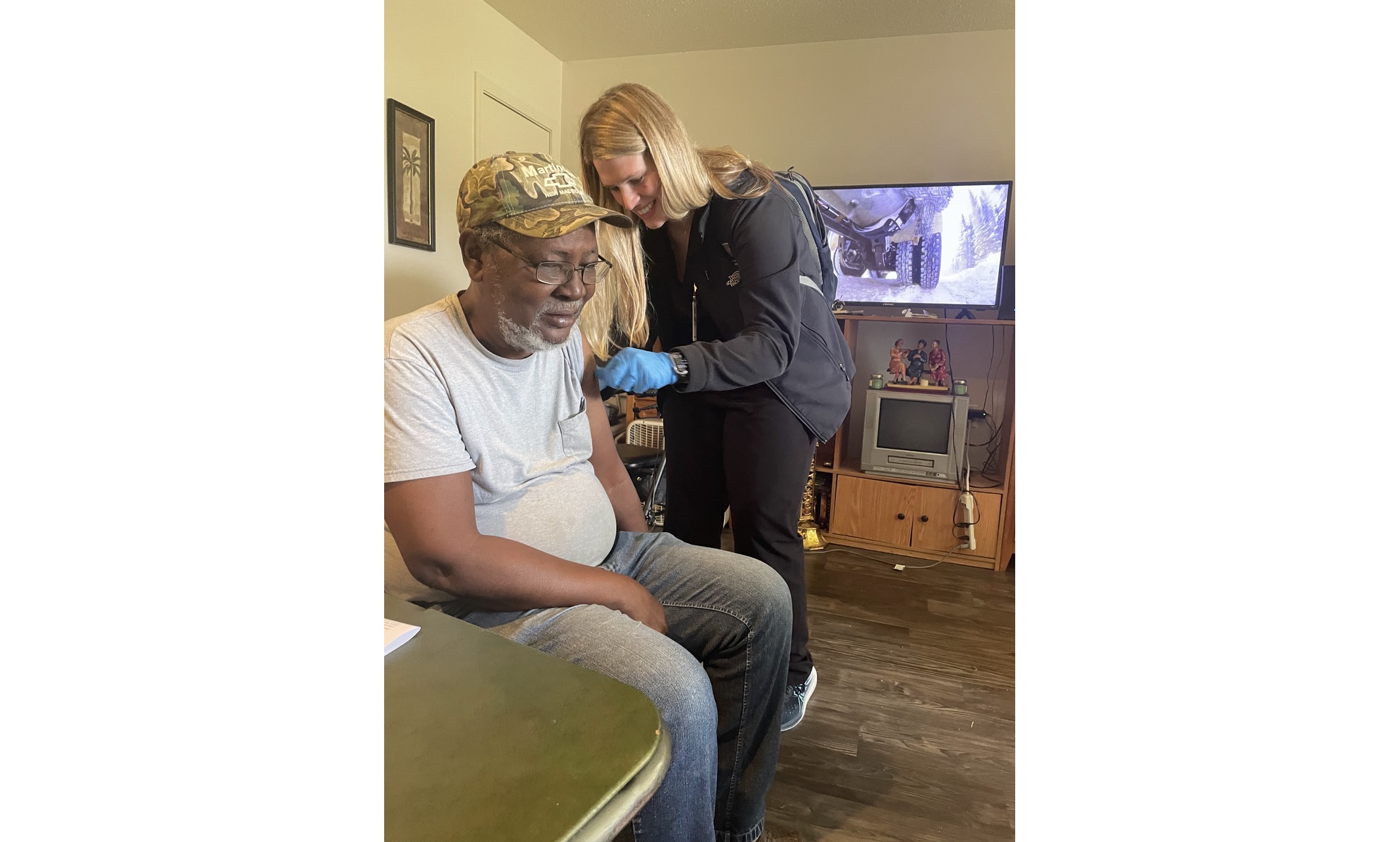
Elderly and low-income patients to receive health care in their homes
Nicole Gorsuch recently received a grant that funds in-home immunizations for low-income, elderly and immobile patients, working to fill a health-care gap that exists in parts of rural Missouri.
For Nicole (Nickie) Gorsuch, the final step after pharmacy school at the University of Tennessee toward being a full-fledged pharmacist was a one-year community residency. Gorsuch was matched in Charleston, Missouri, through a partnership between UMKC and L & S Pharmacy in the town. Charleston is an underserved town in rural southeast Missouri, and Gorsuch is exactly the kind of candidate UMKC hopes to send into these areas.
“Nickie came to our program ready to be molded, excited to learn and ready to practice her skills,” said Sara Opronovich, Pharm.D., the school’s residency program director and Gorsuch’s supervisor.
Gorsuch arrived in Charleston last summer and quickly witnessed the lack of accessible and robust health care.
“We have, like, one doctor that comes to town once a week,” she said.
The lack of health-care facilities, combined with limited transportation and insecure housing, means that residents are often at higher risk of developing a condition that goes untreated, potentially turning serious without intervention. Gorsuch had her work cut out for her.
Along with being the only pharmacy in Charleston, L & S Pharmacy is a community pharmacy that has clinic days to vaccinate residents. During these days, Gorsuch noticed several patients weren’t able to come into the pharmacy to receive their vaccines.
“I was like, ‘well, why don’t we just go to them?’” Gorsuch said.
The program started small.
“One day, we had a few patients, so we just lined them up on our calendar to just go to them to give them their vaccines because, again, they don’t have a car,” she said. “We don’t have Ubers or taxis or anything. They have to walk, and a lot of our elderly population just don’t have the resources to get the things they need.”
As the demand for in-home vaccinations grew, Gorsuch began to think bigger about what more this program could do for residents.
“That’s why we applied for this grant through Missouri Pharmacy Association,” Gorsuch said.
“In rural and underserved locations like southeast Missouri, these problems are amplified,” Opronovich said. “The seemingly simple intervention of giving a shot is also more difficult with fewer providers and more challenges with social determinants of health. Nickie’s work points out the added challenge of providing this health resource and shines a light on the need to provide funding for such interventions.”
The funding from the $60,000 grant was received in late 2023 and has enabled L & S Pharmacy to conduct transportation screenings to assess which patients can travel to the pharmacy and which patients need in-home or delivery care. This gives Gorsuch and the team a more complete picture of their patients’ challenges. The funding also covers transportation fees for the pharmacy team as well as vaccines for some uninsured patients.
Gorsuch’s in-home immunization program has shed even more light on the existing health-care challenges that rural communities face.
“We had a patient who has been to the pharmacy a lot, and I never knew that he didn’t have transportation (until screening), but he walked to the pharmacy,” Gorsuch said. “I never knew because I never asked. The more that we ask, the more we know.
“It’s not a really walkable area, but for some patients it has to be because they don’t have any other way.”
Gorsuch’s work at L & S Pharmacy will continue through the end of her residency in summer 2024. The program has enough funding for at least the next five months. With the help of community partners like grocery stores in Charleston, Gorsuch hopes to reach more potential patients who are not already in the health-care system in places they already. Community partners like grocery stores and food pantries open up conversations about the benefits of vaccines and how their local pharmacy is there to help.
“The more we can get out to the people, the better we are able to capture everyone,” Gorsuch said.
Mar 25, 2024
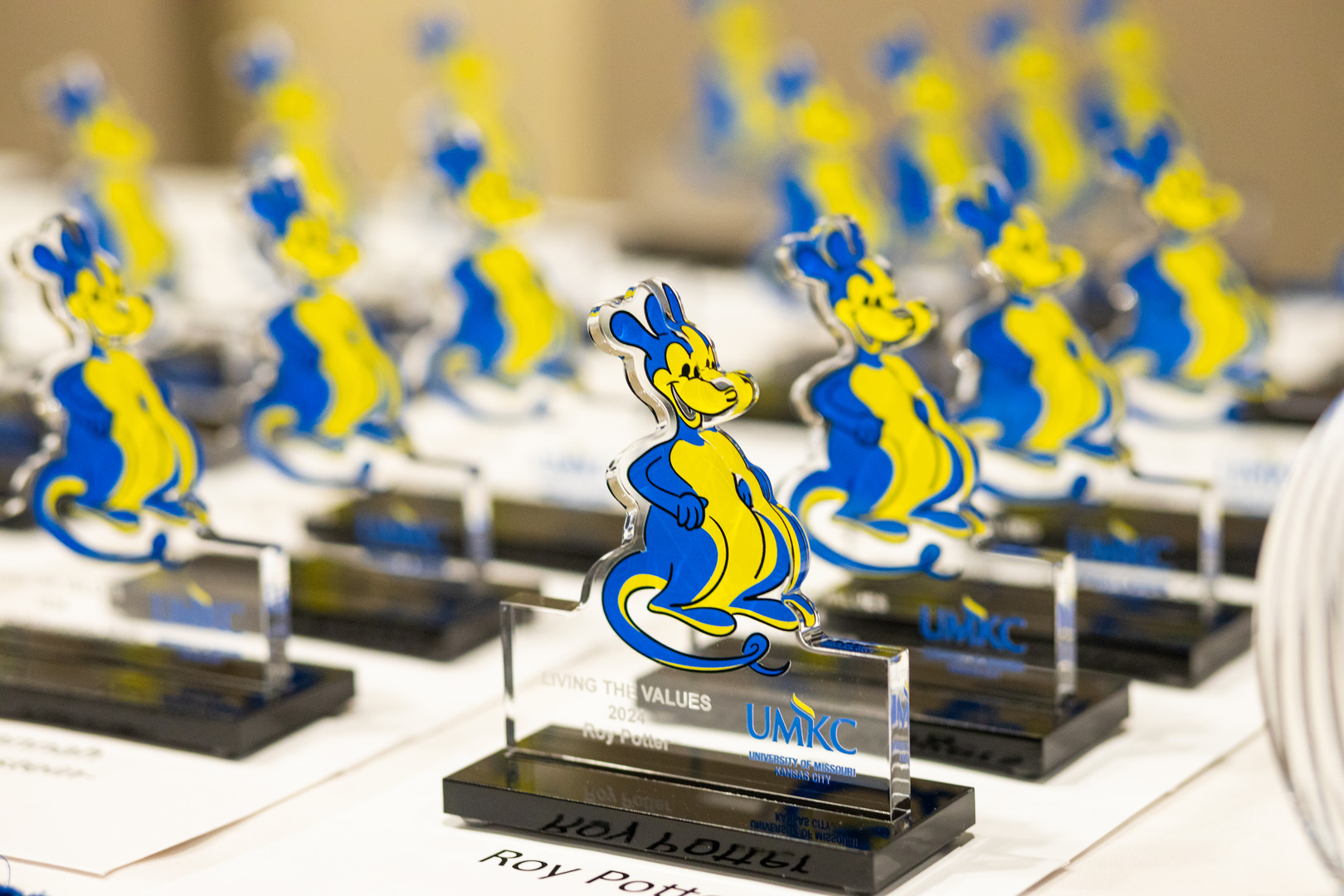
2024 Staff Awards celebrate service milestones and accomplishments
The University of Missouri-Kansas City recognized staff across all academic units and various programs and departments at the 2024 Staff Awards ceremony in March. The ceremony recognized more than 200 employees who have shown an incredible commitment to their personal success, as well as the growth and success of UMKC.
The ceremony began with remarks from Chancellor Mauli Agrawal who shared his admiration for the hardworking staff at UMKC.
“I am always overwhelmed by the dedication of our staff and all of your accomplishments,” Agrawal said. “Whether you were recognized today or not, you are essential to the success of our students and to the success of our university.”
During the ceremony, Bill Marse, director of biomedical communications at the School of Dentistry, took to the podium to introduce awardees and share his remarkable service milestone of 50 years at UMKC.
“I am fortunate to be in a position where coming to work is a choice,” Marse said. “It’s a very exciting, rewarding and enjoyable choice.”
In typical UMKC style, the ceremony closed with a spirited and celebratory “Roo Up!”
Congratulations to the 2024 awardees:
Staff Council Dedication Award
Kim Kushner, IT Project Manager, Information Services
Excellence in Student Success Staff Award
Scott Ezzell, Bloch Manager of Admissions and Recruitment, Henry W. Bloch School of Management
Excellence in Research and Creative Works Staff Award
Brian Kanoy, Senior Program/Project Support Coordinator, School of Science and Engineering
Excellence in Engagement and Outreach Staff Award
Nate Addington, Director of Engagement and Outreach, External Relations and Constituent Engagement
Inclusive Opportunity AND Excellence Staff Award
Lorena Juanez, Senior Admissions Counselor, Student Success and Academic Assurance
Excellence in Planning, Operations and Stewardship Staff Award
Sarah Beth Schulz, Executive Assistant to the Dean, School of Science and Engineering
Rising Star Award
Caroline Kelly, Senior Academic Advisor, School of Medicine
Chancellor’s Staff Award for Extraordinary Contributions
Chris Popoola, Faculty Affairs Specialist, Faculty Support and Academic Innovation
Living the Values Award
Roy Allen, Director of Research and Institutional Programs, Missouri Institute for Defense & Energy
Petra Bricker, Career Advising Manager, School of Medicine
Jordan Davis, Senior Manager of Admissions, UMKC Conservatory
Keichanda Dees-Burnett, Assistant Dean of Student Support and Director of Multicultural Student Affairs, Student Affairs
Onekia De Leon Franklin, Senior Office Support Assistant, School of Nursing and Health Sciences
Barb Domke, Senior Academic Advisor, Henry W. Bloch School of Management
Emma Fahrlander, Strategic Communication Specialist, Strategic Marketing and Communications
Hannah Hohenstein-Flack, Senior Executive Assistant, School of Humanities and Social Sciences
Brian Kanoy, Senior Program/Project Support Coordinator, School of Science and Engineering
Susi Krulewich, Director of PAL Program, Curriculum and Assessment
Chauncey Kuhl, Plumbing and Electrical Supervisor, Finance and Administration
Megan Malcom, Degree Auditor, Student Success and Academic Assurance
Susan Miller, Library Information Specialist, University Libraries
Joey Medellin, Senior Program/Project Support Coordinator, UMKC Innovation Center
Christi Posey, Head Coach, Intercollegiate Athletics
Roy Potter, Senior Technology Resource Manager, School of Dentistry
Janet Rogers, Executive Assistant, School of Law
Laura Rupp, Director I Event Services, External Relations and Constituent Engagement
Amanda Sanders, Business Support Specialist II, KCUR
Crystal Simonis, Research Compliance IRB Manager, Office of Research Services
Bailey Tennesen, Senior Educational Program Coordinator, School of Education, Social Work, and Psychological Sciences
Rick Thomas, Manager IT, Information Services
Molly Tugushi, Office Support Associate, School of Pharmacy
Supervisory Development Series Graduates
Melissa Allison
Carol-Le Braden
Kayla Channell
Nicole L’Amour
Gabriela Sa Teles
Sarah Major
Carla Marquina Panduro
Danielle Marx
Lora Owens
Katherine Sylvester
Dr. Elson S. Floyd Administrative Leadership Development Program
KC Atchinson
Elizabeth Hoffman-Shrout
Nathan Jacobs
Angela Jenkins
Andre Logan
Melissa Newkirk
Gabriela Sa Teles
Bryan Scrivener
Kaitlin Woody
Series on Leadership Essentials Program
Avery Brotherton
Andrea Cady
Jamie Charles
Sarah Dresslaer
Tanna Engle
Rebecca Ireland
Kim Kushner
Tara Lane
Nathan Lonngren
Carla Marquina Panduro
Gregory McMullen
Lora Owens
Zachary Parker
Organizational Perspectives and Leadership Program
Tom Bachmann
Carol-Le Braden
Yolanda Branch
Katey Collins
Christina Davis
Shay Duncan
Susan Garrett
Teresa Huff-Pomstra
Laura King
Noah Kramer
Alia Krzyzanowski
Alyssa Lally
Jacob Lazzo
Anthony Maly
Amy McKune
Mako Miller
Megan Raney
Olujimi Sode
Emily Strayhall
Rick Thomas
Thomas Willoughby
Staff who graduated with a UMKC degree in Spring 2023, Summer 2023 or Fall 2023
Katie Anton
Shaun Bernardon
Jessica Hill
Nicole L’Amour
Jameilla Robinson
James Surber
Douglass Whitehead
Theresa Wright
5 Years of Service
Silas Arnold
Deidre Ashley
Katherine Atcheson
KC Atchinson
Tom Bachmann
Kenneth Bledsoe
Angela Bolen
Keishea Boyd
Carol-Le Braden
Sharon Breshears
Jennifer Brown
Dylan Burd
Krystal Burghoff
Joseph Crow
Allen Dale
Timothy Dean
Brett Dietrich
Patrick Dixon
Mary Donahue
Nikhila Donti Reddy
Mackenzie Doss
Sarah Dresslaer
Megan Elsen
Brooke Fischer
Chainy Folsom
Garren Frasher
Danny Freeman
Georgia Freidhof
Kathryn Grindstaff
Teresa Huff-Pomstra
Phillip Humphrey
Curtis Jacey
Ellis Johnson
Chante Keller
Laura King
Anne Kipper
Michael Knabel
Kay Lee
Richard Lentz
Brandon Martin
Hannah Martin
Hope McMorrow
Susan Miller
Leslie Mohan
Tram Nguyen
Mark Pederson
Mariah Peel
John Pragman
Prasanna Reniguntala
Jessie Riggs
Janey Stephens
Nomin Ujiyediin
Kimberly Vittorino
Kelly Weaver
Shelby Webb
Abby Weiser
Krisana West
Robert Wren
Tejkumar Yentrapragada
Alexander Zier
10 Years of Service
Patricia Baldwin
Casey Bauer
Amber Blair
Karen Bronsman
Kenneth Brooks
Rosana Challacombe
Joe Constantino
Amannda DeBoef
Clint Dominick
Dustin Dye
Aaron Fajen
Ronald Jones
Rebecca Markley
Laura Michaelsen
Tamara Morris
Julie Myer
Julie Smith
John Sulzer
Joyce Ward
Kenneth Wesley
Ryan West
Thomas Willoughby
Laura Ziegler
15 Years of Service
Katie Anton
Stephen Barnes
Catherine Battles
Steven Bowman
Elizabeth Couzens
Michael Cowan
LaRae Elliott Vowiell
Katherine Garey
George Gotto IV
Ursula Gurney
Roland Hemmings Jr
David Hoskins
Kingsley Kakie
Michelle Kroner
Brad Martens
Terrence McKelvy
Donald Parmalee
Suyopa Pinto
Amy Samaripa
Sheila Thomas
Jared Wight
20 Years of Service
Eric Anderson
David Babcock
Matthew Bunch
Carol Calhoun
Keichanda Dees-Burnett
Amber Heffernan
Joey Medellin
Sarah Morris
Rosa Nataraj
Helen Perry
Stephen Pottebaum
Christopher Prewitt
Arzelyn Umali
Almaz Wassie
Rosie Weaver
25 Years of Service
Rosie Booze
Dennis Clark
Dennis Elmore
Nancy Hoover
Steven McDonald
Jane Poe
Paul Schwartz
Vicki Van Noy
30 Years of Service
Della Damon
Jody Jeffries
Steven Jenks
Frank Morris
Nancy Wilkinson
35 Years of Service
Carmen Jaramillo
40 Years of Service
Heidi Updike
50 Years of Service
Bill Marse
Mar 20, 2024
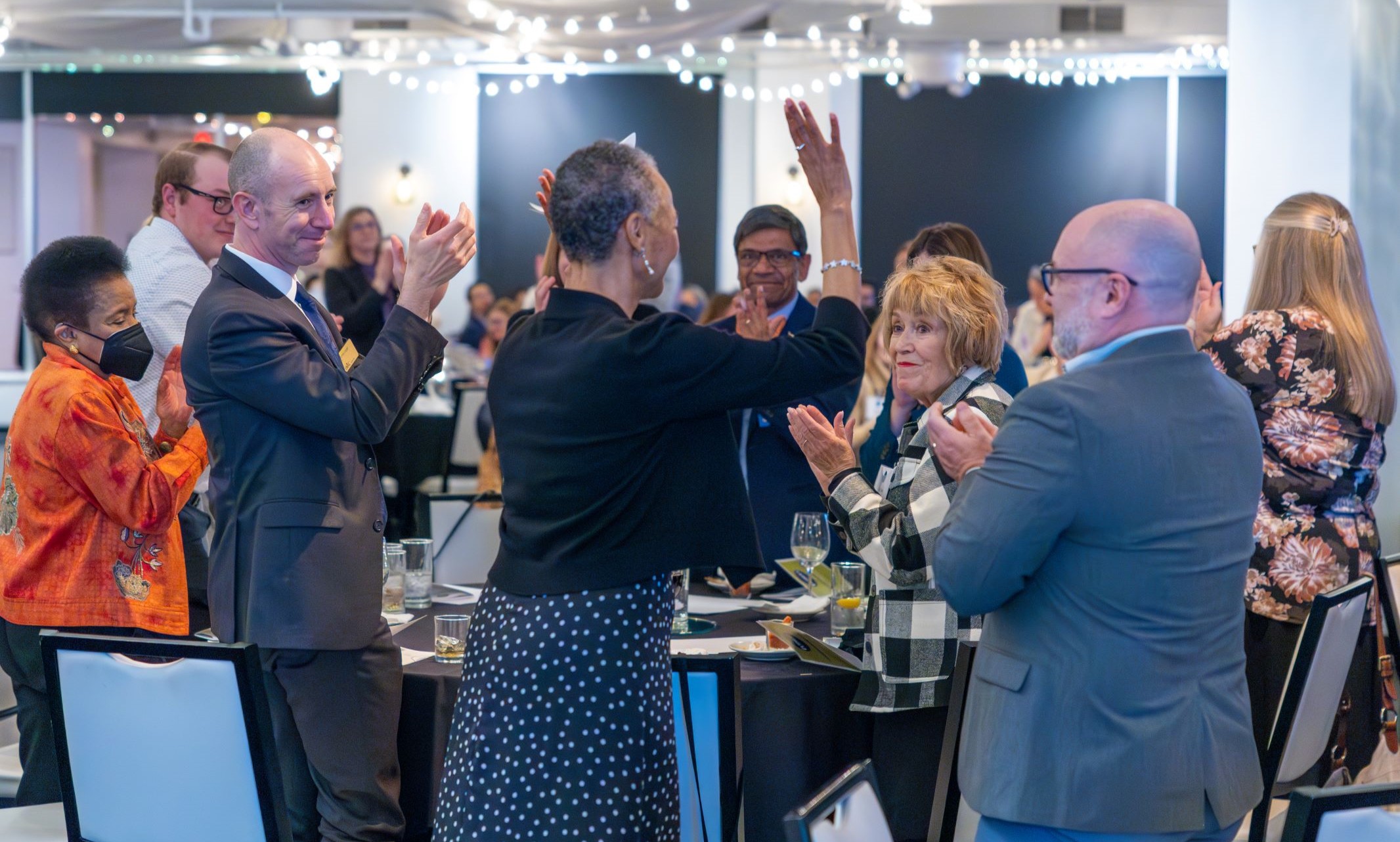
More than $98,000 awarded to 69 recipients to support post-graduate work
The UMKC Women’s Council held its annual reception to celebrate this year’s Graduate Assistance Fund awardees.
Nearly 70 women received funds to support their graduate studies at UMKC. The Women’s Council celebrated 53 years of supporting women in different fields, adding four new awards. Alumna Jacqueline Thompson (D.M.A. ’84), who was a GAF recipient in 1981, gave remarks at this year’s reception.
“I thought I was going to have to drop out because I was running out of money,” she said. “The GAF fund saved me. It helped me complete my degree and contributed to who I am today.” The life-changing award inspired Thompson to commit to give back to the Graduate Assistance Fund every year. Years later, when she revisited UMKC, students who received her help recognized her. Meeting these students made her realize how much the impact of her gift, regardless of size, made to them. “I told myself that I didn’t have to make a lot of waves, but I could be a ripple. If I made enough little ripples, I could make a difference,” Thompson added.To continue making a difference, Thompson also signed an intent form to leave a planned gift to the Women’s Council Graduate Assistance Fund.
Esther Han, conservatory student, giving her remarks
Esther Han is a Conservatory student who is working toward her Master of Music degree in piano performance and pedagogy. She is one of the few GAF recipients who received an additional merit award. “There are not that many fund opportunities for musicians, so being selected is a huge deal,” Han said. “It is very special because I am going to Germany to perform with my husband. I wouldn’t be able to go without GAF because of the graduate tuition cost.” Amen Teshome is a second year Ph.D. student studying cell biology and biophysics. She is working on identifying the impact of certain proteins related to glaucoma. Teshome is a first-time GAF recipient and was also a recipient of an additional merit award.
Amen Teshome, second year Ph.D. student, on the right
“It is super meaningful and rewarding, knowing that my research is making a difference and being validated,” Teshome said. “I feel super motivated to be here, and it’s really helping me push through during research. Because of the GAF, I get to attend the annual meeting for the Association of Research in Vision and Ophthalmology in Seattle. I would not be able to afford it on my own."
This year, the Women’s Council debuted four new named awards for the Graduate Assistance Fund. They were donated by UMKC Provost Jenny Lundgren, Ph.D.; UMKC Chancellor Mauli Agrawal, Ph.D. and his wife, Sue Agrawal, who is on the Board of Directors for the Women’s Council; UMKC Foundation President Amanda Davis and former students and associates of Bibie Chronwall, M.Ed., Ph.D. The fund awards were named after people the donors held close to heart and will help fulfill future generations of women to reach their educational goals and establish careers that will benefit others.
“I’ve been on the selection committee for four years now and have seen the hard work of our students, along with how the GAF impacts them,” Sue Agrawal said. “The best part is the principle of the fund won’t be spent, so it will keep growing over time and help more students in the future.”
The Graduate Assistance Fund has distributed more than $2.4 million since it started.
Mar 15, 2024
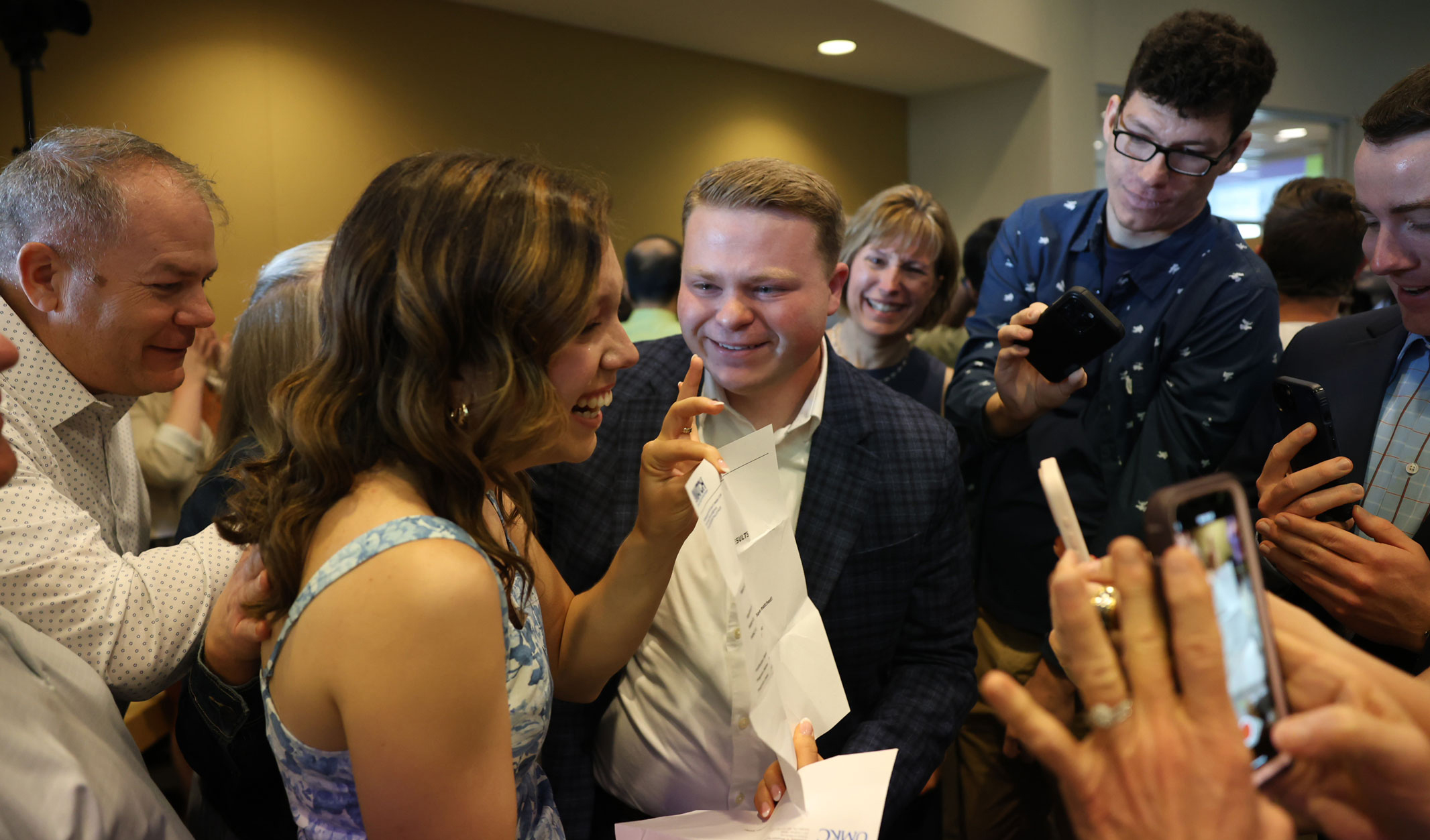
The Class of 2024 discovered where they would be continuing their medical journey
Excited cheers poured out of the UMKC Student Union on Friday, where more than 100 medical students tore open envelopes to discover where they would spend the next few years doing their medical residency training.
The students participated in the National Resident Matching Program, also known as Match Day, when medical students learn what residency program they matched with, as well as the specialty they will practice.
For medical student Divya Jain, it was a long time coming, but very much worth it. Although the Overland Park native is in the six-year B.A./M.D. program at the UMKC School of Medicine, she took a two-year break to get her master’s degree in public policy at Harvard University.
“In the six-year med program, we start preparing for our residency at 18 years old,” Jain said. “It’s been eight years in the making, but matching feels like all the hard work was worth it because we get the privilege of taking care of people.”
Jain matched in a residency program at the University of Washington in Seattle, where she will enter her preferred specialty of OB/GYN. Her rotations at University Health Truman Medical Center instilled in her a passion for improving women’s health. That passion motivated her to also dive deeper into patient advocacy at a systemic level.
“Obviously doctors impact our patients on an individual level, but caring for our patients doesn’t have to stop at the 15-minute visit,” Jain said. “We have so much more potential to make profound changes for our patients’ health through advocacy on a larger level.”
Match Day is a family affair for many students, and that was especially true for Josephine Nwankwo of Oklahoma City, who matched at the Baylor College of Medicine in physical medicine and rehabilitation. She’ll join her sister, Angela Nwankwo (B.A./M.D. ’22), who is also a resident in the same program.
Their mother is a registered nurse, and over the years the family traveled to their mother’s native Nigeria, bringing medications from the United States that weren’t available there. It instilled in Nwankwo a desire to return to Nigeria to bring rehabilitation treatment to the country.
“Visiting my family in Nigeria opened my eyes to the health-care inequities in the world,” Nwankwo said. “I feel like rehabilitation is a resource that’s not really offered in these developing countries. I would love to return to Nigeria because the service could really benefit the people there.”
New School of Medicine Dean Alexander Norbash congratulated the class, while adding some perspective on what was his fifth day leading the school.
“It’s an interesting day, because you began it with a certain mindset, and you’re ending it envisioning yourself in Topeka or San Francisco as a psychiatrist or a cardiac surgeon,” Norbash said. “It’s one of those watershed days you can’t ever forget.”
According to Norbash, more than 50 percent of the students matched into primary care. The class matched in a wide range of specialties, including anesthesiology, emergency medicine, psychiatry, dermatology and several surgical specialties. A third of the students matched in Missouri, with 30 percent of students staying in the Kansas City metropolitan area.
Lauren and Brevin Miller are two of those students who will stay in Kansas City. The married couple, who met in Spanish class their freshman year, were anxiously awaiting their match to see if they would practice in the same city. Both grew up in Missouri. Lauren is from St. Louis and Brevin is from St. Joseph, so the couple had high hopes of staying close to Kansas City.
Gathered in front of nervous family and friends, the couple ripped open their envelopes together and screamed with joy when they read their exciting news. Lauren matched at Children’s Mercy Hospital in Kansas City specializing in pediatrics, and Brevin matched at the University of Kansas Health System, specializing in surgical otolaryngology.
“Matching together is everything,” Brevin said. “All our hard work paid off. And our basset hounds get to stay in Kansas City!”
UMKC Match Day 2024 Results
Mar 15, 2024
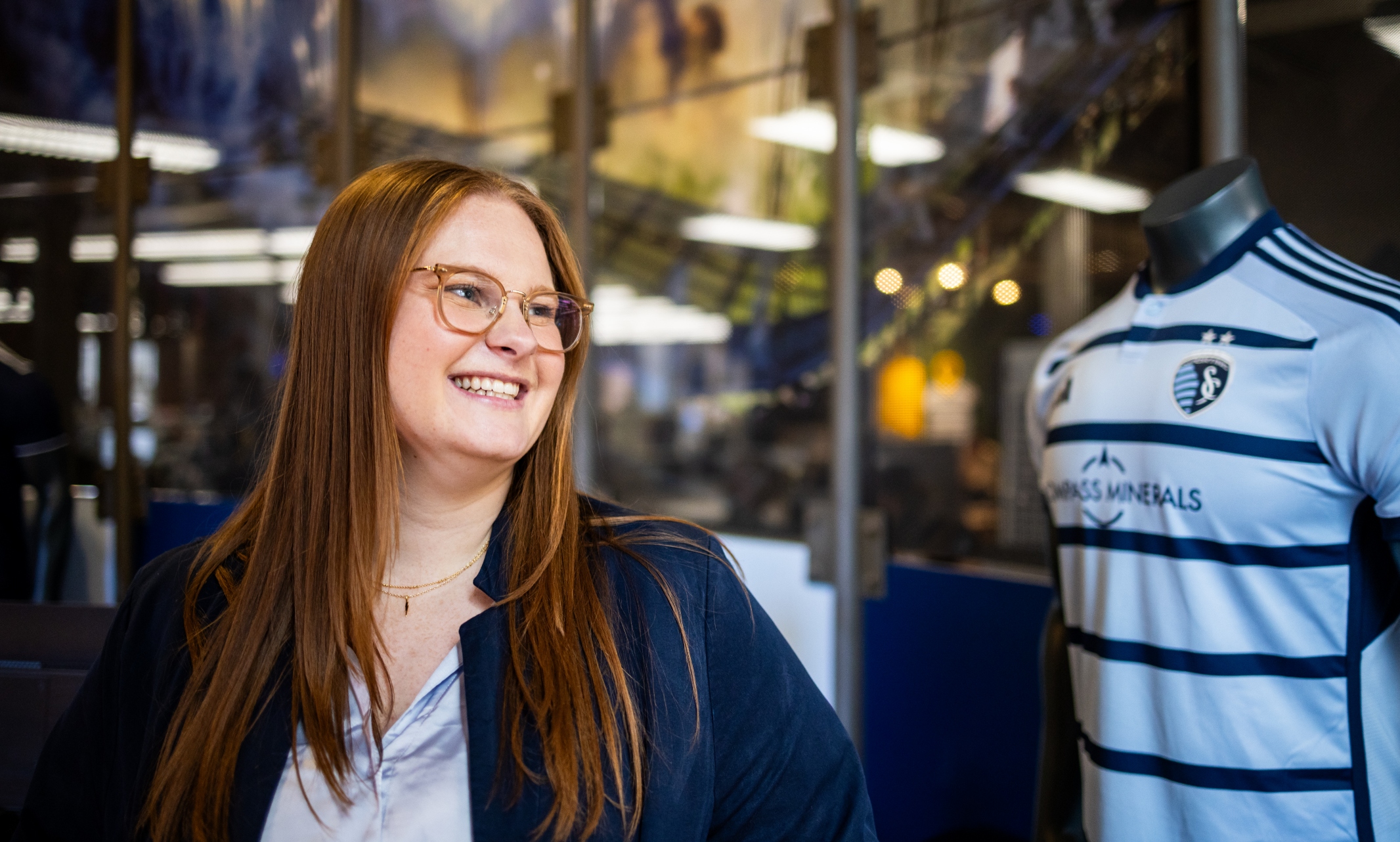
UMKC connections were a perfect match for Annmarie Orlando to pursue sports law
Annmarie Orlando knows two things: she wants a career in sports law, and she wants it in her hometown of Kansas City.
“I chose UMKC because I’m from Kansas City and I knew that I wanted to stay here,” Orlando, student at UMKC School of Law, said. “I’ve grown up here and I know it’s a great city to live in, and there’s lots of opportunities for work.”
One came with longtime UMKC partner Sporting Kansas City. The university and soccer club have been partners for a decade; part of that partnership includes first opportunity for internships for UMKC students.
For Orlando, it’s been the chance to start the career she’s been working toward for years. Orlando was an athlete growing up, and she wanted a career related to sports. After obtaining her undergraduate degree in sports management, a family member suggested law school as a next path. She started law school elsewhere and decided to transfer to return to Kansas City. The experience she’s had here has been unmatched.
Orlando's mentor, Kylie DeWees, a staff attorney at Sporting KC, spoke at the UMKC Sports Law Club in Fall 2023.
“Other than Sporting KC, I’ve had a few more opportunities to get experience while in law school,” Orlando said. “I worked with the athletics department at UMKC and got to work with the athletic director on NCAA rules and compliance. I’ve also gotten to work with NAIA and their lawyers as well.” In addition to working in sports law, Orlando volunteered with the public defender’s office. Although she found the work rewarding, the experience confirmed that her calling was sports law. She credits the law school and real-world opportunities with helping her define her career path. “Getting that real-life understanding of how it actually is working in the legal field while still in school helps figure out if you actually like that area of law,” Orlando said. “The law school’s career center is very helpful. They really care about helping students get experience where they want to be.”
For Orlando, that experience at Sporting KC involved legal research, contract review and learning the unique rules of Major League Soccer, among other things. Her mentor and Sporting KC staff attorney Kylie DeWees says that getting to study sports law in the soccer capital of America is invaluable, especially with the 2026 World Up on the horizon. “Our student interns can drive 15 minutes from class to come here and get practical experience on a big stage,” DeWees said. “You can’t beat that.” With Kansas City’s rising profile in the sports world, Orlando knows that she’s in the right place to begin her career. “Kansas City is a great place to study sports law,” Orlando said. “With the growth the city has seen and all the new teams we’re getting, there are lots of opportunities here.”
Mar 13, 2024
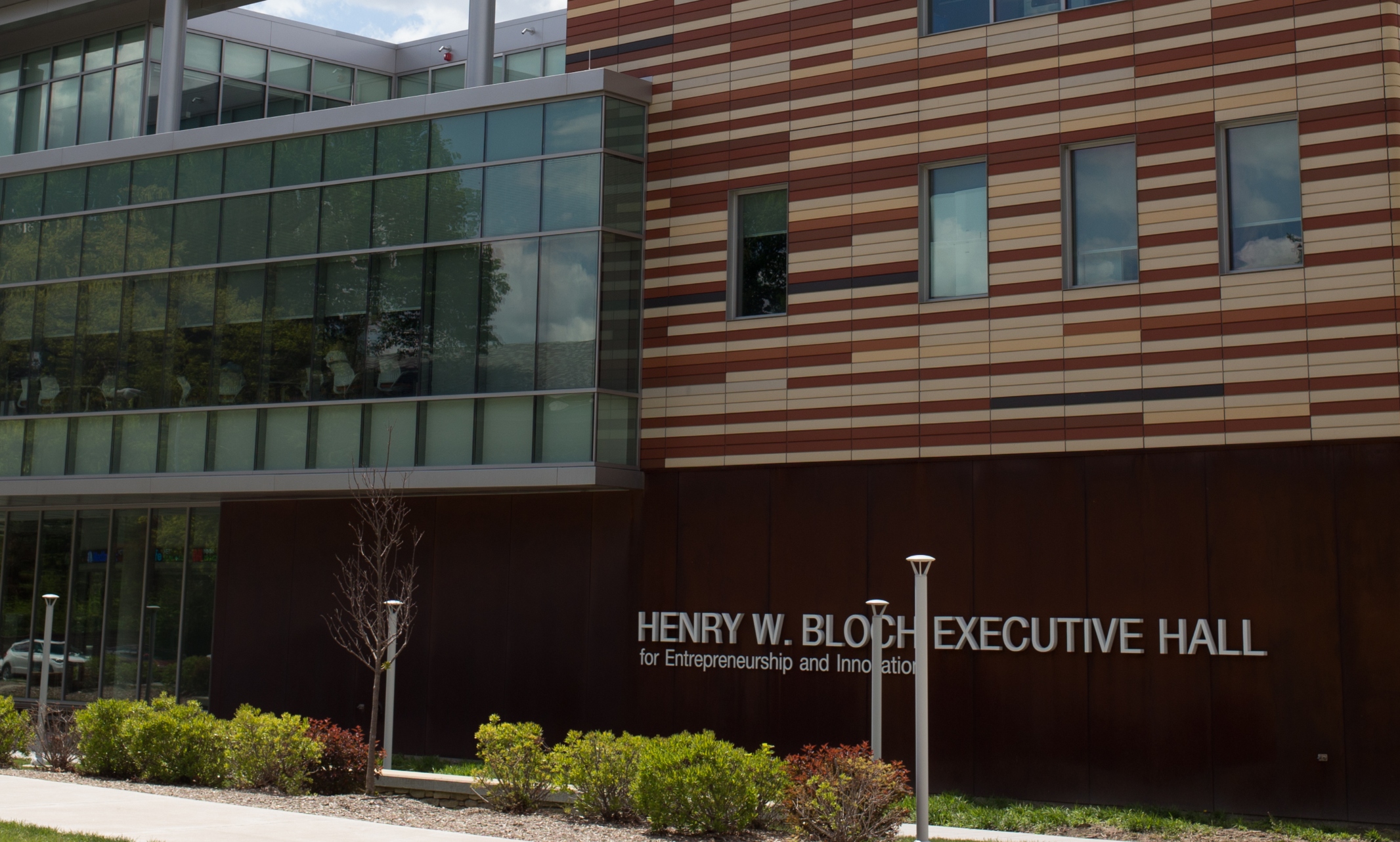
New schedule will offer greater work-week flexibility
The University of Missouri-Kansas City Henry W. Bloch School of Management will implement a new schedule for its Executive Master of Business Administration (EMBA) program to improve the frequency and depth of students’ engagement with the course content and focus more in-person class time to interactive activities, while simultaneously eliminating the monthly Friday class and moving regular classes to two or three Saturdays per month.
Unlike the traditional MBA, the EMBA focuses intensively on enhancing and refining leadership skills. EMBA students already possess extensive work experience and often enter the program while simultaneously working full time.
“These changes will improve student experience by allowing more flexibility in learning and reducing conflicts with students’ work schedules,” said Arif Ahmed, Ph.D., associate dean of the Bloch School.
Program management made the decision after seeking and receiving input from students, community stakeholders, faculty, and staff. Factors including paid-time-off changes, childcare needs and even doctors’ surgery schedules were considered.
“We had a couple of doctors who said you know, I'd really like to do your program, but Friday is my day in surgery and it's never going to happen as long as you have this particular class schedule,” said Eugene Pegler, executive director of student affairs at Bloch.
The changes also include moving a small portion of some courses to asynchronous online engagements distributed over the semester, which allows for focusing more on activities and discussions during the live in-person sessions.
In addition to regular classes, EMBA students complete four signature residency experiences. Two of these intensive courses are in Kansas City, one is in Washington D.C. and the final intensive course is a study-abroad experience, currently in Belgium.
These residency experiences offer a comprehensive exploration of leadership, strategy, public policy and global business. Over the 21-month program, EMBA students also receive dedicated support from their own Bloch executive coach, helping them gain deeper insight into their professional strengths and practice how to leverage them to become a more authentic leader.
The Henry W. Bloch School of Management is currently accepting applications for the Fall 2024 EMBA cohort. Explore the new schedule and program details.
Mar 07, 2024
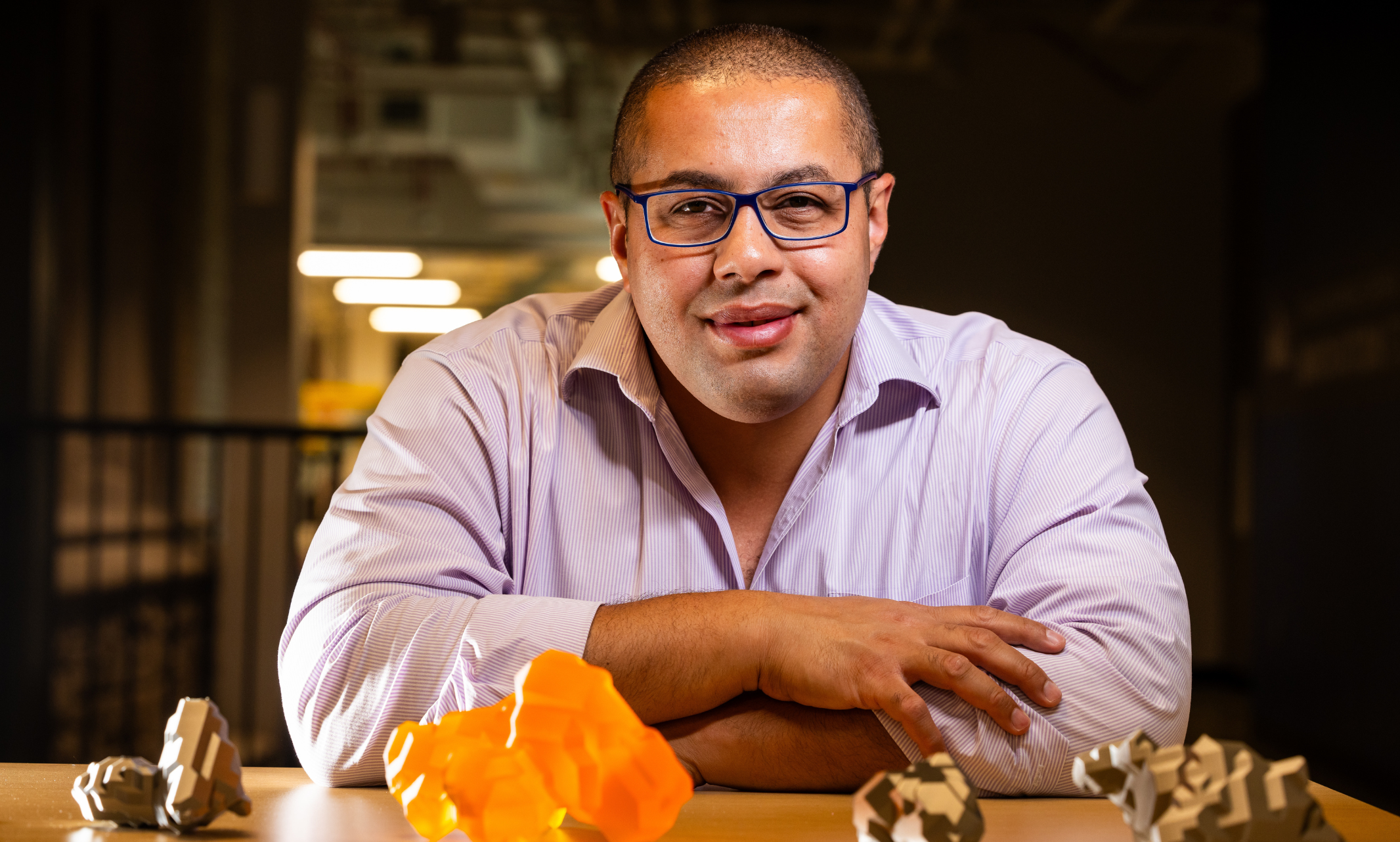
When humans return to the moon, UMKC research will help them avoid problematic interactions with lunar dust while mining that same dust for valuabl...
Ahmed Hassan, Ph.D., associate professor of computing and engineering, is working with partners at the National Institute of Standards and Technology, the U.S. Air Force Research Laboratory and the Space Science Institute to gain a more thorough understanding of the composition and properties of lunar dust. Hassan is crafting three-dimensional models of the shapes of individual, microscopic dust particles.
Why? Lunar dust is literally unearthly. It has unique geotechnical properties due to the absence of geological processes on the moon, such as chemical weathering, humidity and atmospheric wind. And the moon’s magnetospheric interactions and constant collisions with comets and asteroids also create discrepancies.
As a result, the shape of microscopic particles in the moon’s regolith, or lunar dust, differs from the shape of particles in earthly materials that resemble it at the macro level; for example, they have sharper, jagged edges. And those different shapes have to be accounted for.
During the Apollo missions, lunar particles caused significant problems such as abrasion of vehicles, spacecraft and scientific equipment as well as obscuring the solar panels that generated electricity. During a lunar landing, the rocket engine sends dust particles flying “like tiny bullets,” Hassan said.
Lunar dust adhering to spacesuits even caused allergy-like symptoms for the astronauts when it penetrated the atmosphere inside the spacecraft when they returned from moonwalks.
“Depending on the application, lunar regolith (dust) particles can cause serious problems or be used as a valuable resource in future lunar expeditions,” Hassan said. “The research results can help guide a wide range of lunar applications, from electrostatic dust removal from solar panels to using it to fabricate structures on the moon.”
Yes, to build structures. Among the applications of Hassan’s research is the feasibility of using lunar dust to make concrete on the moon, a critically important factor for building permanent settlements.
In his initial study, Hassan and his team were able to model 25 distinct particle shapes from a tiny sample of lunar dust brought back from the moon missions of the 1970s. For his current study, he has access to approximately 10,000 particles.
To prepare for future missions, space scientists created various reproductions of lunar dust, called simulants, crafted from materials on the earth. Recent advances in 3D X-Ray capabilities, however, revealed a problem.
“Some of the simulants matched the physical properties of lunar regolith; some matched the chemical properties. But no one had tried to match particle shapes,” Hassan said.
X-ray nanocomputed tomography (XCT) allowed scientists to examine the shape of particles as small as 400 nanometers (billionths of a meter) in length. That revealed the sharp, jagged edges and other unique properties that the next generation of simulants will have to match.
Future astronauts will be better prepared to deal with the moon’s unique environment, thanks to Hassan’s efforts.
Mar 07, 2024
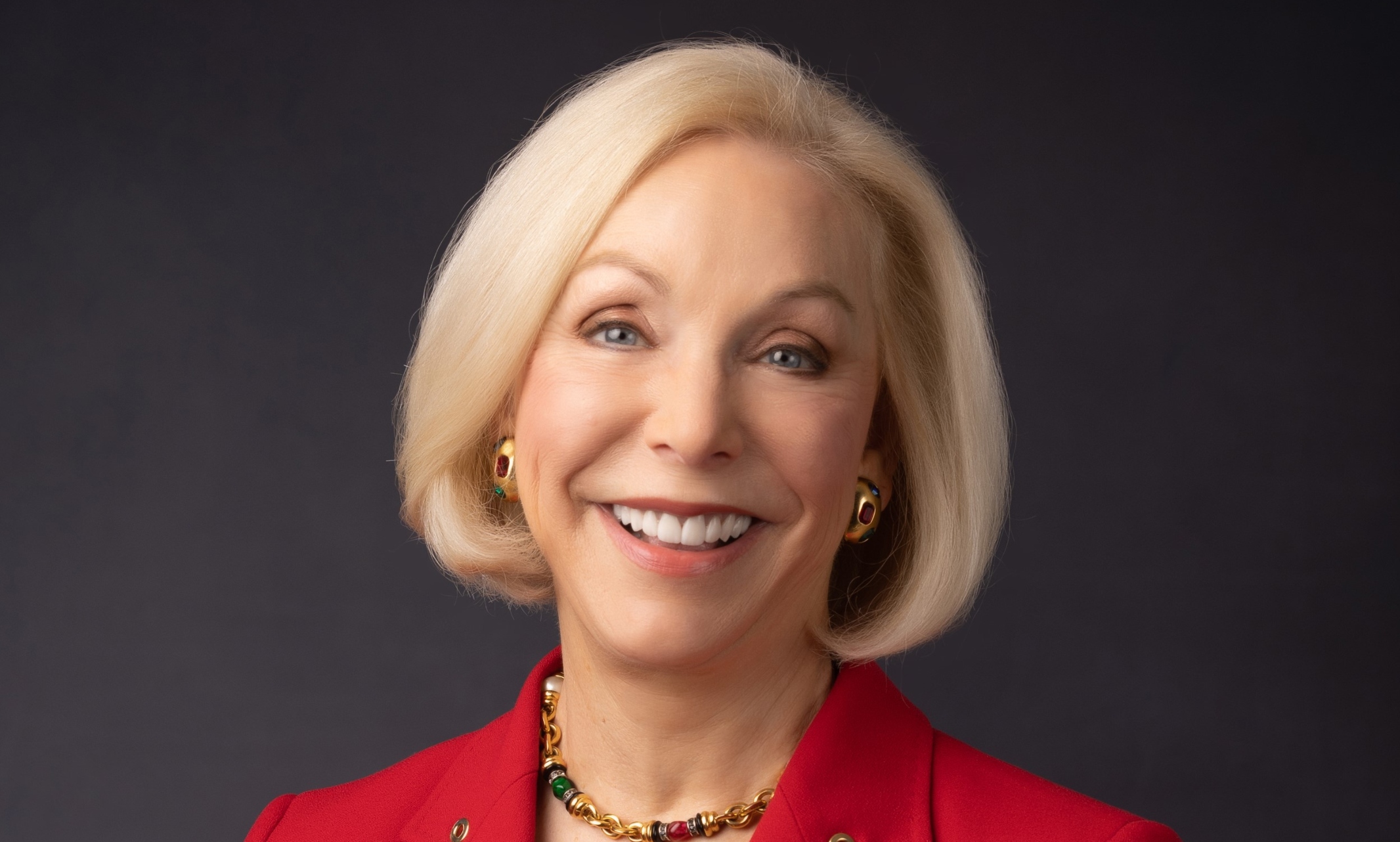
Suzanne Shank's support for UMKC and the Kansas City arts community goes above and beyond
Each year, the UMKC Alumni Association recognizes outstanding alumni achievements with an awards celebration. Suzanne Shank (J.D., M.P.A ‘82) is the Class of 2024 Bill French Alumni Service Award recipient.
From a young age, Shank’s love of the arts shined bright as she committed herself to dance lessons, even performing with the Kansas City Ballet when it was part of the UMKC Conservatory. Despite not pursuing the arts in her professional life, Shank’s support for the place she once performed has been extensive.
“I’ve always appreciated the arts and what they bring to the community,” Shank said. “I also recognize how necessary arts education is to a community.”
Shank has served on the Friends of the Conservatory Board and as a chair for Crescendo, the annual gala supporting student scholarships. In that role, she was instrumental in raising more than $1 million for student scholarships. In 2005, Suzanne and her late husband established the Suzanne Shank and Marty Smoler Scholarship, which supports a student studying in the Conservatory.
“UMKC is so important to Kansas City, and I wanted to be philanthropic where my money would have the most impact,” Shank said. “UMKC has done such an amazing job supporting the needs of the surrounding community and that should be rewarded.”
Shank currently serves on the UMKC Board of Trustees as a vice chair and serves on the executive committee. In addition to serving on the Trustees’ Scholars Committee for many years, where she has been a thought leader and Trustees' Scholar mentor, she also serves on the Next Generation Trustees’ Scholars Working Group. She recently established the Suzanne Shank Trustees’ Scholars Scholarship.
Her impact on the Kansas City community goes well beyond her support of UMKC. She has actively participated in numerous nonprofit associations, showcasing her commitment to philanthropy and community development. Her leadership roles in local organizations such as the KC Ballet, the Symphony League and the Lyric Opera, have contributed significantly to the cultural and artistic fabric of Kansas City.
Mar 04, 2024
